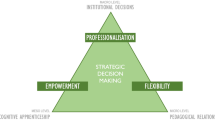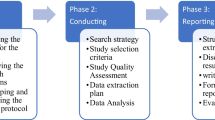Abstract
This investigation explored the challenges of creating meaningful mathematics practices for a community engaged in Distance Education (DE). Specifically, the study maps the influence of new technologies on the practices of a learning community where mathematics was taught remotely. The theoretical framework of this study utilised Bourdieu’s work on practice to consider the changed nature of the field, in this case, remote education provision, over time. By using Bourdieu’s notion of field, we are better able to understand the ways in which practices and discourses shape particular ways of working in rural education provision. The results of the study show that Field 1 was innovative and beyond the non-school world, while Field 2 lagged behind the technological resources of the non-school world.

Similar content being viewed by others
References
Arnold, P. (2001). Review of contemporary issues for rural schools. Education in Rural Australia, 11(1), 31–42.
Askew, M. (2004). Teaching and learning primary numeracy. Address presented to the Special Topic Group 1 at the 10th International Congress on Mathematical Education, Copenhagen, Denmark.
Bourdieu, P. (1991). Language and symbolic power. Cambridge: Harvard University Press.
Bourdieu, P. (1993). Sociology in question. London: Sage.
Bourdieu, P. (1998). Practical reason. Cambridge: Polity.
Bourdieu, P., & Wacquant, L. J. D. (1992). An invitation to reflexive sociology. Chicago: Chicago University Press.
Considine, G., & Zappalà, G. (2002). The influence of social and economic disadvantage in the academic performance of schools students in Australia. Journal of Sociology, 38(2), 129–148.
Du Plessis, D., & Bailey, J. (2000). Isolated parents’ perceptions of the education of their children. Education in Rural Australia, 10, 1–26.
Goos, M. (2004). Learning mathematics in a classroom community of inquiry. Journal for Research in Mathematics Education, 35(4), 258–291.
Human Rights and Equal Opportunities Commission [HREOC]. (2000). Emerging themes: National inquiry into rural and remote education. Sydney: HREOC.
Human Rights and Equal Opportunity Commission [HREOC]. (2000). Recommendations: National inquiry into rural and remote education. Sydney: HREOC.
Leigh, T. (2008). Maths tracks NSW series. Melbourne: Pearson Education.
Lerman, S. (2001). Cultural, discursive psychology: A sociocultural approach to studying the teaching and learning of mathematics. Educational Studies in Mathematics, 46, 87–113.
Lowrie, T. (2006). Establishing school-family partnerships in distance education contexts: Pedagogical engagement in isolated settings. Journal of Distance Education, 21(2), 96–114.
Lowrie, T. (2007). Learning engagement in distance and rural settings: Four Australian cases. Learning Environments Research, 10, 35–51.
Lyons, T., Cooksey, R., Panizzon, D., Parnell, A., & Pegg, J. (2006). Science, ICT and mathematics education in rural and regional Australia: The SiMERR national survey. Canberra: Department of Education, Science and Training.
Mills, C. (2008). Opportunity and resignation within marginalised students: Towards a theorisation of the reproductive and transformative habitus. Critical Studies in Education, 49(2), 99–111.
Ministerial Council on Education, Employment Training and Youth Affairs (MCEETYA). (2005). National report on schooling in Australia 2005. Carlton South, Vic: Author.
New South Wales Department of Education and Training [NSW DET]. (2010). Teaching and learning exchange. [TaLe] Accessed 10 June 2010 from http://www.tale.edu.au
Radford, L. (2009). Why do gestures matter? sensuous cognition and the palpability of mathematical meanings. Educational Studies in Mathematics, 70, 111–126.
Ryan, R. (2001). Human rights, remote Australia, and the VET sector. Australian Training Review, 40, 28–29.
Webb, J., Schirato, T., & Danaher, G. (2002). Understanding Bourdieu. Thousand Oaks: Sage.
Zevenbergen, R. (2000). “Cracking the code” of mathematics classrooms: School success as a function of linguistic, social and cultural background. In J. Boaler (Ed.), Multiple perspectives on mathematics teaching and learning (pp. 201–224). Westport: Alex.
Author information
Authors and Affiliations
Corresponding author
Rights and permissions
About this article
Cite this article
Lowrie, T., Jorgensen, R. Teaching mathematics remotely: changed practices in distance education. Math Ed Res J 24, 371–383 (2012). https://doi.org/10.1007/s13394-011-0031-2
Received:
Revised:
Accepted:
Published:
Issue Date:
DOI: https://doi.org/10.1007/s13394-011-0031-2




